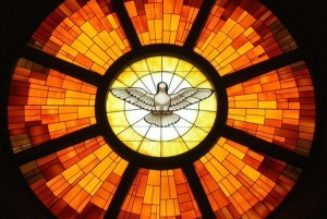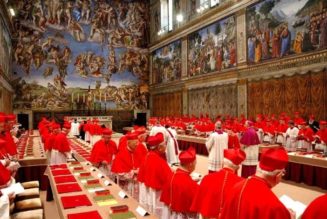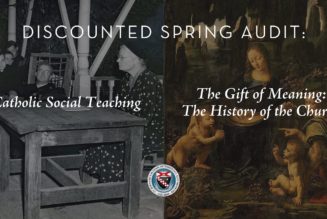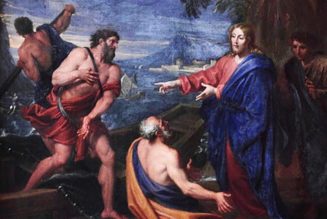, January 14, 2021

God has a job for each of us to do in life, and he won’t stop bugging us until we answer. And even then, we won’t be left on our own.
That is what the readings explain this Sunday, the Second Sunday in Ordinary Time, Year B.
The Gospel shows the apostles approaching Jesus after John points him out — for the third time.
Today’s Gospel as it is read at Mass begins: “John was standing with two of his disciples, and as he watched Jesus walk by, he said, ‘Behold, the Lamb of God.’”
But that first line is slightly different in you Bible. There it says: “The next day John was there again with two of his disciples.”
In fact this is the third day John has spoken about Jesus, and the second time he pointed right at him. The day before he even said more: “Behold, the Lamb of God who takes away the sins of the world.”
So today’s Gospel isn’t the story of the apostles immediately rushing to Christ’s side once he was pointed out; it’s the story of them eventually following Jesus after repeated offers.
This is how it is in our lives. Most of us are pointed to Jesus again and again before we actually approach him.
It is also critically important to notice who John says Jesus is.
John doesn’t call Jesus “the master” or “the teacher.” He calls him “the Lamb of God.” The apostles would have known exactly what that meant — he was the final fulfillment of the yearly offering of the Paschal Lamb; he was the Suffering Servant foreseen by Isaiah.
They would know Psalm 40, which we pray this Sunday at Mass, which also points to Jesus Christ when it says: “Sacrifice or offering you wished not, but ears open to obedience you gave me. Holocausts or sin-offerings you sought not; then said I, ‘Behold I come.’”
So when the first apostles finally decided to follow Jesus, it was not his teaching or political ramifications they were responding to. It was his self-sacrifice; his self-offering for their sins.
We find this in literature. The image of the suffering Christ has haunted everyone from Lancelot in Mort d’Arthur to Julia in Brideshead Revisited. I like the way Marie Bellet puts it when a lapsed Catholic character in one of her songs says, “Why are you always suffering at me?”
The suffering Christ won’t leave us alone. We can’t forget the one who died on the cross for our sins. It is impossible to ignore the Lamb of God.
Once you hear it, his voice will never stop.
Even after “the two disciples … followed Jesus,” the voice continues, changed.
“Jesus turned and saw them following him and said to them, ‘What are you looking for?’ They said to him, ‘Rabbi’ — which translated means Teacher —, ‘where are you staying?’”
It’s important to remember that the one addressing them was introduced to them as the Lamb of God — the sacrifice for their sin.
When it’s the suffering face of Christ asking you what you are looking for, he cuts off answers you might otherwise have. Are you ultimately looking for comforts? Try telling the Suffering Servant that. Are you looking mainly for financial independence? Tell that to the cross-bearer. Are you looking for power and respect? Tell that to the man being ridiculed as he dies for you.
Suddenly, the only way to answer that question is the way the apostles did: We are looking for whatever puts us close to you.
The apostles do what Samuel does in the first reading: They go to stay with the master.
In the first reading, Samuel is “sleeping in the temple of the Lord where the ark of God was.”
Samuel was apparently taking the night shift as the keeper of the Temple flame. But he was literally doing what the apostles do in the Gospel.
“Where are you staying?” they ask and he says to them, “Come, and you will see.”
So “they went and saw where Jesus was staying, and they stayed with him that day.”
Like Samuel, they stay by the side of the Lord, listening. Samuel has to ask Eli several times what he is hearing when his name is called. Eli finally tells him to answer the voice with “Speak, Lord, for your servant is listening.”
Hearing the Lord is not enough — becoming his servant is the only response. The passage ends with: “Samuel grew up, and the LORD was with him, not permitting any word of his to be without effect.”
The Second Reading, from St. Paul, brings this home in a significant way for each of us. “Do you not know that your body is a temple of the Holy Spirit?” asks Paul. Samuel isn’t the only one who is a keeper of the Temple flame: We are too, in our bodies. There, too, we have a duty to the Lamb of God. “You have been purchased at a price,” says Paul. “Therefore glorify God in your body.”
Only acting on what you hear can turn the voice of God from a nagging conscience to an energizing inspiration.
John was so energized by his encounter with Christ that he can never forget the moment it happened. “It was about four in the afternoon” has become famous as a shorthand for that special time when, as the song Amazing Grace puts it, “How precious did that grace appear the hour I first believed.”
Importantly, the moment doesn’t just fill the apostles with joy; it sends them into action. They run to get Andrew’s brother, Simon, and bring him to Jesus, saying, “We have found the Messiah.”
It is significant that today’s Gospel reveals that it was in their first encounter that Jesus gave Simon a new name. “Jesus looked at him and said, ‘You are Simon the son of John; you will be called Cephas’ — which is translated Peter.”
Simon didn’t earn the name of Peter, the Rock, by professing his faith at Capernaum, and much less was the name given not to him but to his profession of faith — Jesus gave him that identity from day one, and with his grace Peter eventually lived up to his new name.
This happens to each one of us. In a mysterious passage in the book of Revelation, God has a name for us in heaven, an intimate name only he and we can know. I think that name is our deepest identity, our ‘Cephas’; God’s own idea of who we are.
And I think it’s that deep identity that we keep straining to hear in God’s insistent voice.
Tags: prayer, Second Sunday in Ordinary Time (Year B), Sunday Gospel, Sundy readings
Never miss a post! Subscribe below to our weekly newsletter.
Related
Join Our Telegram Group : Salvation & Prosperity








